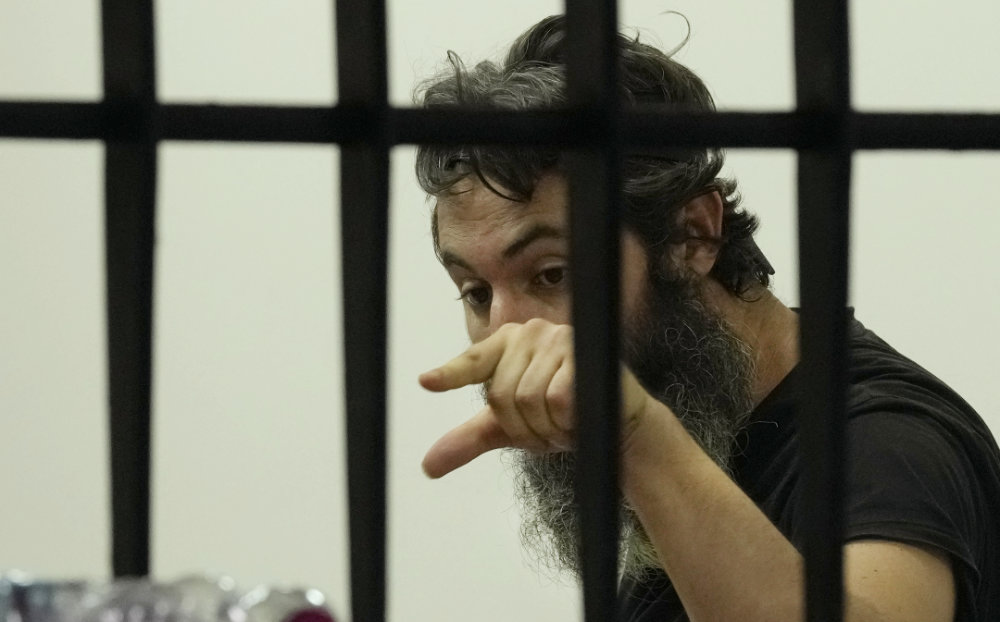BEIRUT: The Lebanese man who held eight bank employees hostage at gunpoint while demanding the release of his frozen savings remained behind bars on Friday pending further inquiries.
Bassam Al-Sheikh Hussein was arrested after voluntarily leaving the Federal Bank branch in Beirut on Thursday evening following a seven-hour standoff.
On Friday, members of his family blocked Al-Ouzai Road in Beirut in protest at his continued detention saying it was in breach of an agreement made the night before.

An armed man Bassam al-Sheikh Hussein, 42, speaks with one of his hostages inside a bank, in Beirut, Lebanon, Thursday, Aug. 11, 2022. (AP)
Al-Sheikh Hussein, 42, surrendered after being told his family would be given $35,000 of his money and being promised he would be questioned and then set free. Inside the bank he had been armed with a pump-action shotgun and gasoline, which at on point he said he would use to set himself alight.
Many people in the crowd that had gathered outside the bank during the siege applauded as he was led away. Lebanon’s central bank imposed a freeze on all bank deposits in 2019.
Despite the promise that he would be allowed to walk free, after leaving the bank Al-Sheikh Hussein was arrested and detained on the orders of the Lebanese judiciary.
Lawyer Haytham Ezzo told Arab News that Al-Sheikh Hussein was detained by the Information Branch of the Lebanese Internal Security Forces and denied access to a lawyer despite it being his legal right to have one present.
“Even if no one sues him, there’s the public right,” he said. “Either the investigating judge asks for his release after he’s referred to him by the Information Branch, or asks for his arrest.”
Ezzo said it was possible that Al-Sheikh Hussein had been arrested for endangering state security or threatening to kill or kidnap.
As for the money paid to the family, that could not be reclaimed by the bank as “it doesn’t constitute a criminal tool. It is the arrested depositor’s right and property,” he added.
Hassan Mughnieh, the head of Lebanon’s Depositors Association, who was in charge of the negotiations between Al-Sheikh Hussein and the bank, told Arab News that “neither the employees who were held hostage nor the Federal Bank sued him.”
But the gunman would remain behind bars until next week at the earliest, he said.
“Things will become clear on Tuesday, as it’s the weekend and judges do not work on Monday in the Justice Palaces.”
He added: “As depositors, we will organize a protest in front of Beirut’s Justice Palace on Tuesday and in front of the Directorate General of the Internal Security Forces. We don’t have a problem with Al-Sheikh Hassan’s arrest, but justice says the bank owner should also be arrested.”
Mughnieh said he had received many calls from other disgruntled bank depositors saying they wanted to act as Al-Sheikh Hassan had done.
Lebanese bank customers have had their deposits frozen since the start of the country’s economic crisis and slump of its currency.
Castro Abdallah, head of the National Federation of Trade and Employees Unions, said on Friday that “the affected people should stand together in order to recover the stolen public and depositors’ money.”
He called on unions to protest next Thursday in the commercial street of Hamra in Beirut.
Lebanon’s caretaker deputy Prime Minister Saade Chami warned that Lebanon was standing at a crossroads.
“We need to acknowledge the reality and the crises we are facing and confront them. This means that we should take the needed measures and carry out the critical and necessary reforms that put the country on the right path.”
He added that the financial and monetary policies adopted in recent years in a bid to buy time had failed and that time was now running out.
“No one will rescue us if we don’t try to rescue ourselves,” he said. “Receiving help from the little friends we have left in the world will not achieve the desired outcome.”














